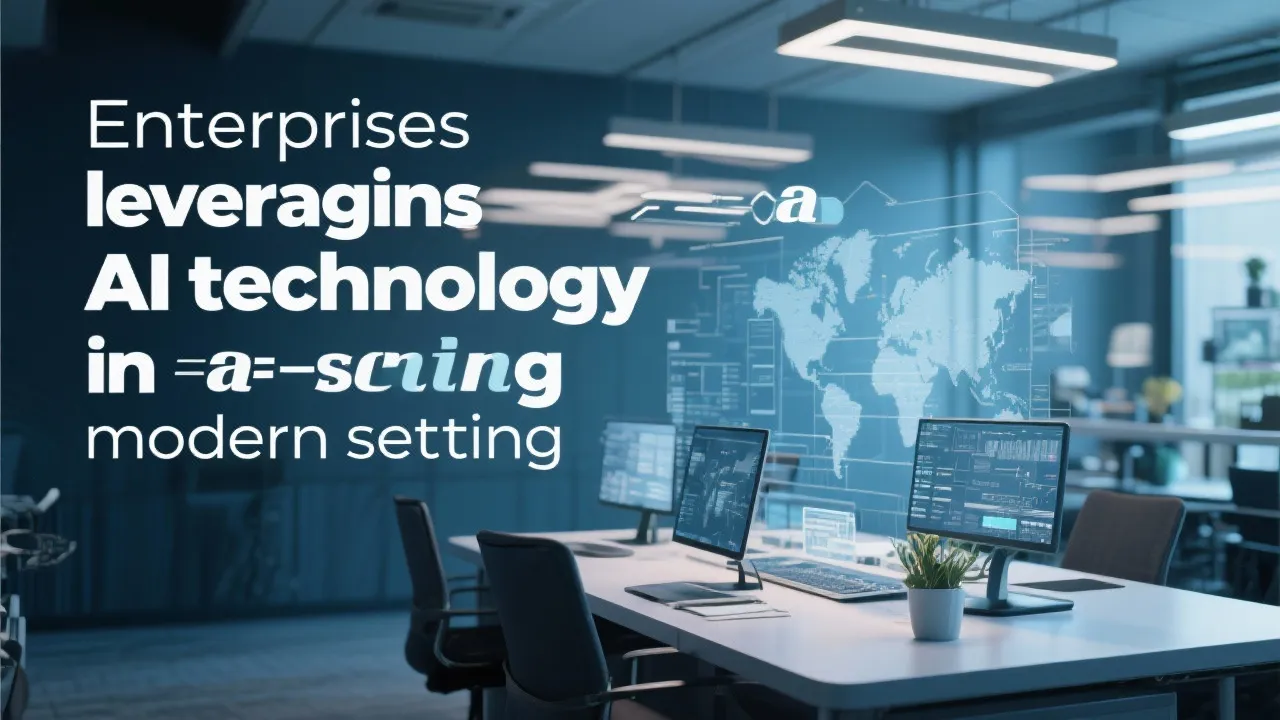AI solutions for enterprises have become integral in revolutionizing business operations, enhancing decision-making, and driving efficiencies. These solutions range from automating mundane tasks to providing insights through machine learning and data analysis, offering businesses strategic advantages in today's digital economy. As companies increasingly seek to innovate, understanding AI's potential is essential.

Artificial Intelligence (AI) represents a transformative force in the business world, enabling enterprises to streamline processes, enhance customer experiences, and make more informed decisions. AI solutions for enterprises encompass a wide range of applications, from automating routine operations to harnessing machine learning for predictive analytics. These advancements empower businesses to not only optimize internal workflows but also strengthen their market position, driving growth and competitive advantage. As the global economy progresses towards an increasingly digital landscape, the role of AI in reshaping enterprise operations and strategies cannot be overstated.
AI has evolved remarkably over the years, transitioning from theoretical concepts to robust applications in various industries. The early days of AI were characterized by simple rule-based systems that could perform specific tasks under predefined conditions. However, with advancements in computational power, algorithms, and data availability, AI technologies have grown to include sophisticated machine learning models, neural networks, and deep learning.
The growth of big data has also played a pivotal role in this evolution. Enterprises generate massive amounts of data daily, and AI systems are designed to process and analyze this data efficiently. Today, AI technologies not only perform predefined functions but continuously learn and adapt based on new information. This capacity for continuous improvement enables organizations to remain agile, making real-time adjustments to strategies and operations. Thus, AI is not just a tool for automation; it serves as a transformative agent that redefines how businesses operate and compete in their respective markets.
AI technologies are applied in various business functions to unlock new possibilities. Here are some of the critical applications:
AI is not merely a tool but a strategic business asset. Companies utilizing AI effectively can gain insights into customer behavior, enhance productivity, and adapt to changing market dynamics with agility. The integration of AI in business strategy can lead to innovation and sustained competitive advantage, providing substantial ROI in the long term. Organizations that fail to embrace AI risk falling behind as competitors leverage these technologies for superior insights and efficiency.
Moreover, the strategic deployment of AI fosters a culture of innovation within organizations. It encourages cross-functional collaboration, pushing teams to think creatively about problem-solving and customer experience. As AI capabilities expand, businesses are also prompted to explore new business models enabled by these technologies.
For instance, companies in the automotive industry are leveraging AI to experiment with autonomous vehicle systems, giving rise to entirely new operational paradigms. As AI continues to evolve, it paves the way for businesses to explore uncharted territories, thereby redefining traditional industry boundaries.
As technology evolves, so do the trends in AI. Noteworthy developments in enterprise AI solutions include:
Enterprises across sectors are witnessing the transformative impact of AI solutions:
| Industry | AI Application | Result |
|---|---|---|
| Retail | AI for personalization in e-commerce | Increased customer engagement by 30% |
| Manufacturing | Predictive maintenance with AI | Reduced equipment downtime by 25% |
| Finance | Fraud detection using AI algorithms | Enhanced fraud detection accuracy by 40% |
| Healthcare | AI for diagnostic imaging analysis | Improved diagnostic accuracy and reduced analysis time by 50% |
| Telecommunications | Network optimization with AI | Enhanced network performance and 20% reduction in outages |
Despite the myriad benefits, implementing AI in enterprises is fraught with challenges. Some notable obstacles include:
Looking forward, the role of AI in enterprises is set to expand further. Emerging technologies like quantum computing promise to vastly enhance AI capabilities, allowing for more complex problem-solving and data analysis. The convergence of AI with other technologies such as VR, AR, and IoT will create new business opportunities and enhance user experiences.
Moreover, as AI systems evolve, there will be a greater emphasis on ethical AI practices, ensuring that AI decision-making is transparent and fair. Enterprises will need to navigate the ethical challenges associated with biases in AI algorithms and ensure that AI applications align with societal values.
Organizations adopting an AI-first approach will likely gain first-mover advantages in their respective industries, leveraging insights that allow them to stay ahead of competition. Continuous innovation and adaptation will be critical for those looking to capitalize fully on the capabilities of AI.
In conclusion, AI solutions for enterprises represent a crucial shift toward digital transformation, providing businesses the capability to evolve and thrive in a rapidly changing market environment. As innovation continues to break boundaries, those enterprises harnessing AI will likely set the benchmarks for future business success. The integration of AI in business strategies is not just a trend; it is a necessary evolution to remain competitive and effective in the rapidly digitizing global economy. Companies prepared to embrace this change will position themselves not just to survive but to flourish in the age of AI.
Explore the Tranquil Bliss of Idyllic Rural Retreats

Ultimate Countdown: The 20 Very Legendary Gaming Consoles Ever!

Understanding Halpin and its Influence

Affordable Full Mouth Dental Implants Near You

Discovering Springdale Estates

Illinois Dentatrust: Comprehensive Overview

Embark on Effortless Adventures: Unveiling the Top in Adventures Made Easy Outdoor Equipment

Unveiling Ossur Valves: Innovation in Prosthetics

Unlock the Full Potential of Your RAM 1500: Master the Art of Efficient Towing!
